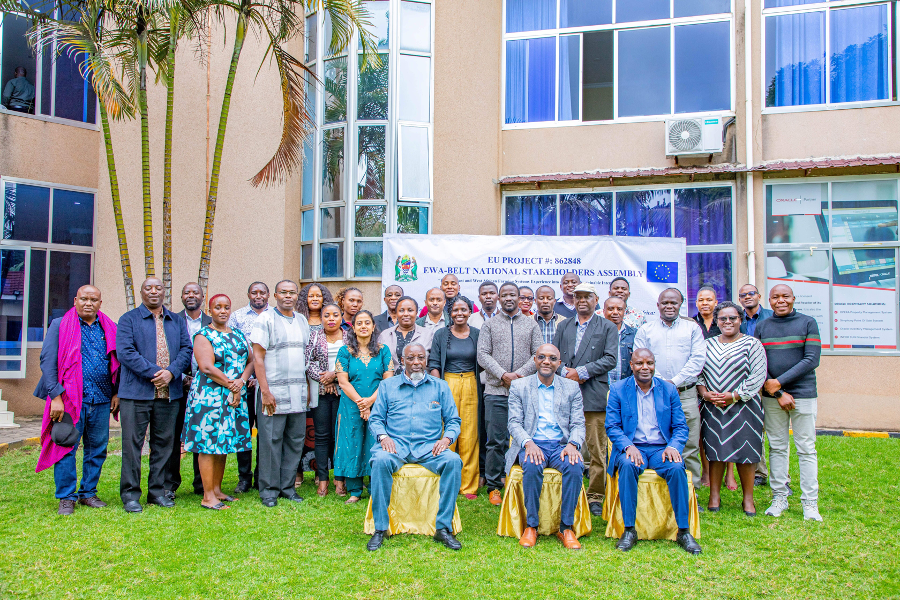FIELD VISIT UNIVERSITY OF NAIROBI – CHARLES ODIRA INTERVIEW
- OCCAM - Observatory on Digital Communication

- Nov 17, 2022
- 4 min read
On Thursday, October 27 2022 During the field visit organized in the demonstration field of the University of Nairobi, different farmers had the opportunity to express their knowhow/ yield improvements/technological advancements experienced within the context of the EWA-BELT Project. Among others, Charles Odira. Charles is one of the people who were added in the projects and he’s a fabricator and also a farmer (peanuts field). Here are some questions he answered during the Field visit.
Why do you grow peanuts and do not grow maize?
I don’t grow maize for a matter of principle, and I’m telling you why.
If you grow maize, even if it snows everywhere, the cost of growing it and the cost of buying it almost balances if you reach a small scale, but if you do it on a large scale, it makes.
So as a matter of principle, I don’t grow maize.
But as for my neighbor, there is a ministry of agriculture that I think did intervention well giving farmers something to spring, but sometimes farmers get lazy and don’t get it (ministry’s offers), and my neighbor didn’t get it.
Summary: the costs between growing and buying maize is equal if thought on a small scale as it could be for local farmers.
In terms of challenges on peanuts, what are your major problems, what would you prioritize?
What I would prioritize as a farmer, it is the production, because when I imagine that I have to get this from Uganda, I have to get this from Tanzania, Malawi, you see, it is produced there, and I am the one taking the costs of transportation, but if I got it from here, then it would be much cheaper.
Personally I don’t come from this area, I just happened to buy land here, and when you read, you realize that the very point where I come from it is peanut growing region in Kenya, but if you there to buy a sack of peanut then they tell you “give us a week to get it for you”, and if they get it for you, then it would be of one variety, it would be a mixture, and that is peanut growing area, so you can imagine what happens in other areas considered no peanut growing areas.
So, for me, it would be the production.
Summary: the major element to prioritize is the production over the real quality of the seed: example on buying foreign seeds over local ones, these lasts are sold in a mixture rather than of one single type.

Thank you very much, I want to know the process of harvest of the peanut
Here, we do the entire process of harvest, as per the peanuts. When someone comes here, we want them to go through the whole process, we do not tell them “when you get to this point, go to town”, so we finish everything here, so we also go to see a bit of the processing.
So we also make the equipment which we do the processing. There are a lot of them in the market, and here I have a lot of equipment that people have brought and they tell me “ I bought this one, it was supposed to be processing peanuts but it doesn’t, so what do I do?” and I have a lot of them here and I just try to help out, and I ask for how much they paid for it, I ask them to check the receipt and I tell them “Mine cost 65k Shillings, so bring me 15K shillings (the difference between Charles’s price and the one of market)” in a sense of helping out.
And then helping people in it, they ask for more equipment and businesses go on.
Summary: it is essential to teach and show that the equipment is also present in the field of production, in a sense that the harvest cycle is completed.
Is there any kind of structure, let's say, among you, as cooperatives? Why are you helping them?
So we were talking (Charles and Prof Okoth) but not yet met when this project came, and it came afterwards. She said to call me and she introduced me to the project. So it all started like they needed my services, and when I started providing my services, I realised that “it is good also for me”, so I came here (referring to the very standing land) asking “can I rent some land?” so that when the farmers produce, I also produce and that is where I saw the challenges and then came in with this equipment.
So for now it is a farmer-to-farmer (relationship), and what you are asking I think it is the way further, and in coming days I think it will be good for us, as farmers, to form maybe a cooperative, where we have a common goal and then anybody is helping in the cooperative
Summary: what started with simply knowing each other and the reciprocal participation in the project, could have potentialities in the direction of building a more social network between farmers heading to a structure as a cooperative.





Comments